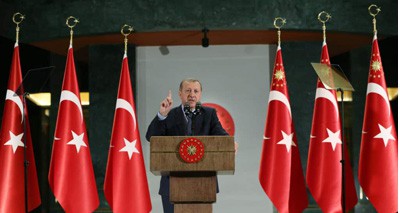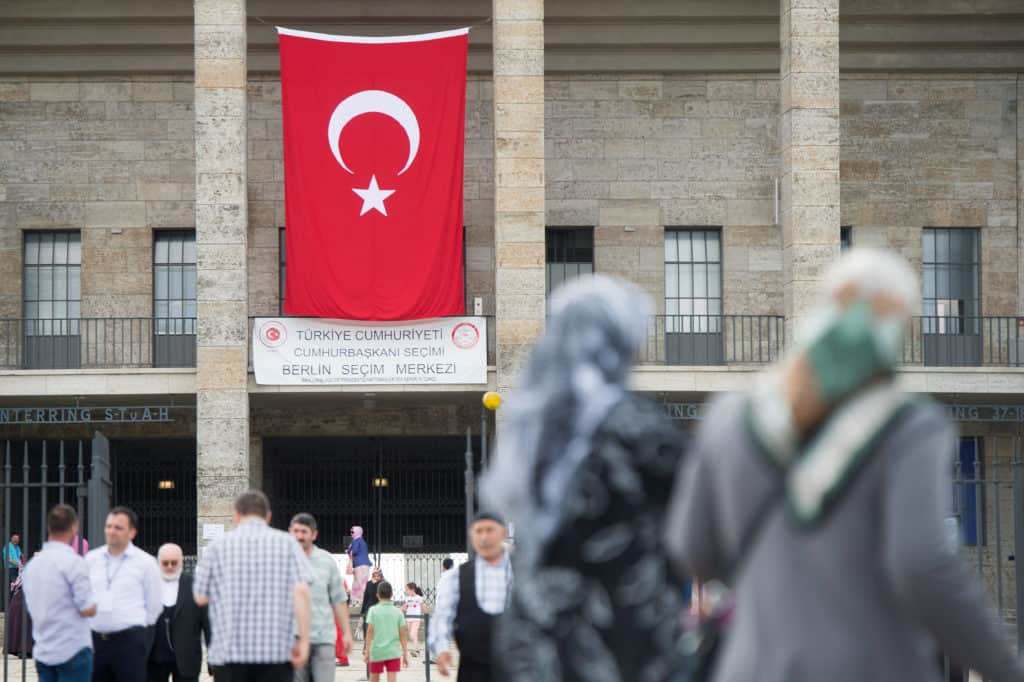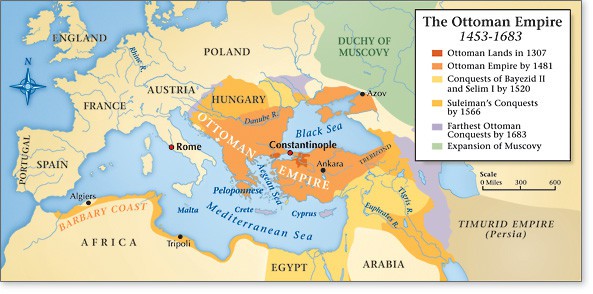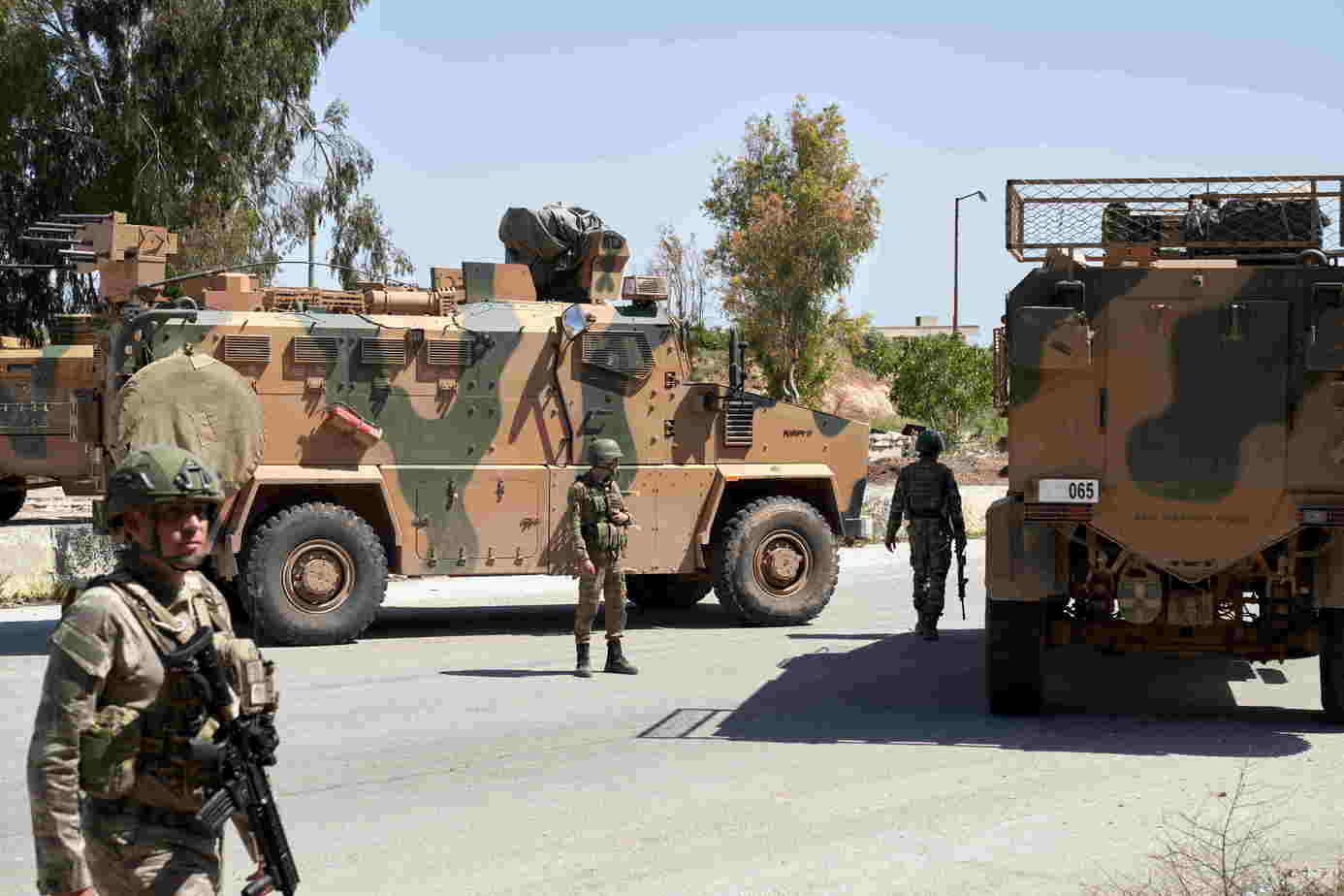Erdogan’s Ottoman Aspirations
Sinclair Jenkins, American Renaissance, September 9, 2020

The Turkish government made international news in July when it decided to turn the Hagia Sophia, a 6th-century Orthodox church built by the Emperor Justinian, into a mosque. By changing Hagia Sophia’s status after 75 years as a museum, Ankara gave a clear sign of aggressive Islamism. The message became even clearer when last month it decided to turn Istanbul’s Church of St. Saviour, a 4th-century Greek Orthodox church with a history stretching back to Emperor Constantine, into a mosque as well. An imam with a conqueror’s sword was at the first Islamic prayer service at Hagia Sophia.
The growth of Islamism in Turkey is the work primarily of one man, President Recep Tayyip Erdogan. In power as prime minister and president since 2003, he has shown time and time again that he is an anti-Christian and anti-Western despot dedicated to removing the legacy of Kemal Ataturk, the founder of modern Turkey, who spent decades building a pro-European and secular Turkey.
One of Mr. Erdogan’s most effective weapons is people. In March 2017, he spoke to supporters in the Turkish city of Eskisehir about their duty to have children. He urged this duty especially on Turks living in Europe, because having children is “an act of revenge against the West’s ‘injustices’.” He added:
Go live in better neighborhoods. Drive the best cars. Live in the best houses . . . . Make not three, but five children. Because you are the future of Europe. That will be the best response to the injustices against you.
Turks in Europe like what they hear. In 2017, when Turkey voted on whether to have a stronger presidency and central state, millions of flag-waving Turks took over the streets of Amsterdam, Berlin, Vienna, and London. There was so much violence and worries about the influence of Turkish politicians in Europe, that several countries banned the demonstrations. (The referendum, which Mr. Erdogan supported, passed.) His plan to turn Europe’s Turks into a loyal voting bloc is working.

People, who are eligible to vote in Turkey leave the Olympic Stadium after voting in Berlin, Germany. (Credit Image: © Maurizio Gambarini / DPA / ZUMA Wire)
Mr. Erdogan often rails against “injustices” against Turks in Europe, claiming they are frequent targets of right-wing violence. In fact, Turks often fight each other. In June, a feminist and pro-Kurdish rally in Vienna ended in roving street battles with members of the extremist Turk-nationalist Grey Wolves.
In Germany, where Turks make up as much as 5 percent of the population, assimilation isn’t working. An official survey conducted in 2016 found that 36 percent of German Turks believed that Islam is the answer to all society’s ills, while 7 percent thought violence in the name of Islam was acceptable.
Turkish organized crime is heavily involved in narcotics, prostitution, and human trafficking. In 2012, a study found that of the 471,067 non-German gangsters in Germany, 106,396 were Turks. The same study also found that 27 percent of drug traffickers, 22 percent of cocaine traffickers, and 35 percent of rapists were Turks.
Another interpretation of Erdogan’s invocation of “injustices” could be the Islamist view of history: In the 16th century, the Christian West stopped Islam’s divine mission to control and convert the whole world. This conviction is examined in Tamim Ansary’s 2010 book, Destiny Disrupted. The Turks, a people originally from Central Asia, invaded Asia Minor. Their centuries-long conquest destroyed the Eastern Roman Empire and turned a bastion of Greek civilization and Orthodox Christianity into an Islamic state.
It was also the Ottoman Turks who conquered much of the Christian Balkans and turned their male citizens into slave-soldiers called janissaries. Along with forced conversions and two failed invasions of Vienna, the Ottomans oversaw a slave system in Crimea and North Africa that captured as many as one million Europeans. Anglo-Americans were victims of the Ottomans, as the sufferings of John Smith of Jamestown and the Barbary Wars demonstrate.

Mr. Erdogan appears to see himself as a new Ottoman sultan; his government wants to resurrect Turkey as the great power of the Near East and Southeastern Europe. To this end, Erdogan has not only supported ISIS and other pan-Islamist groups, but continues to use their existence to threaten Europe.
Erdogan often mobilizes the millions of Middle Eastern and Central Asian migrants in Turkey. In 2015, he flooded Europe with them as part of his demographic strategy, and he did so again earlier this year. The most recent Erdogan deluge has been contained only by Greek soldiers and police.
One of the few voices raising the alarm is French President Emmanuel Macron, who weeks ago announced France’s support for Cyprus and Greece “in the face of Turkey’s violation of their sovereignty.” For the Greeks and Greek Cypriots, the latter of whom have seen decades of Turkish occupation, discrimination, and desecration of churches, it is long past time for Western Europe to end the Turkish threat.
When the blond and blue-eyed Mustafa Kemal Atatürk established the Republic of Turkey on the ruins of the Ottoman Empire, he wanted to create a Westernized nation that would leave behind Ottoman medievalism, autocracy, and Islamism. Although Atatürk was certainly guilty of crimes, most notably his National Movement’s ethnic cleansing of Greeks, Armenians, Kurds, and Assyrians, and although the Soviets helped him with weapons and money[1], Atatürk built an authoritarian but secular state that was pro-Western for much of its existence.

Mustafa Kemal Atatürk addresses a crowd in 1924.
His bulwark was the army. The modernized, professional army took as its mission to defend Turkey’s secular constitution from all enemies, but especially Islamists and communists. On May 27, 1960, the National Unity Committee, an army junta composed of US-trained officers, overthrew the democratically elected 24th government of President Mahmut Celâl Bayar. They opposed Bayar’s plans, to lift the ban on Arabic calls to prayer, reintroduce Islamic education in schools, and re-Islamify society. There has since been a series of coups, but Erdogan took revenge for Islam in the November 2002 election, when he defeated the Republican People’s Party (CHP), the party established by Atatürk and long supported by Turkish army generals.
Since 2003, Erdogan and his party have expanded power with the help of their voter base of rural Turks and middle-class shop owners. The only serious attempt to overthrow Mr. Erdogan came in 2016, when the army once again intervened. This coup was such a failure that some think that Mr. Erdogan engineered it. Indeed, the coup gave the aspiring sultan the pretext he needed to eradicate the last remnants of resistance.
By October 2016, Erdogan had recalled 400 Turkish military envoys to NATO, and that year he cut the number of generals by 38 percent and officer cadets by 8 percent. Once a pillar of the CHP establishment and the last line of defense for Turkish secular republicanism, the Turkish army is now run by Erdogan loyalists. There have been similar purges of media and universities.
The army is no longer independent, and the opposition CHP is weak, but Mr. Erdogan still has weaknesses. The army purge has weakened it just as it is fighting in Syria and Libya, and even in its own backyard against the long-running Kurdish insurgency. In Syria, Turkey wants only to create a buffer zone in the north where Turkish and allied Syrian forces can contain Kurdish militias. Ankara cannot defeat the Syrian Army, especially since President Bashar al-Assad enjoys air and ground support from the Russians. Likewise, in Libya, the Turks are backing the weaker party.

May 12, 2020, Aleppo, Syria: Turkish forces secure a section of the M4 highway, which links the northern Syrian provinces of Aleppo and Latakia, near Ariha in Syria’s jihadist-controlled northwestern Idlib province. (Credit Image: © Karam Almasri / NurPhoto via ZUMA Press)
The US and Europe can exploit Turkey’s imperial overreach so long as moral hysteria or liberal internationalism do not get in the way. France has already said it is willing to counter Turkish movements in the Mediterranean and Aegean, while the US and the UK should consider either helping the Tobruk government in Libya (which would mean supporting Russian foreign policy) or simply staying out of the mess.
The US and Europe should provide economic, political, and military aid to Greece, which has suffered the most from President Erdogan’s demographic aggression. Greek warplanes and ships are even now stalking Turkish submarines in the waters off of Athens. It is time for the West to voice strong support for the 600,000-strong Hellenic Armed Forces; NATO has nothing to lose by supporting Athens; Ankara stopped being a serious ally years ago.
Finally, in the most important front in the war against Erdogan’s Neo-Ottomanism, Germany, the Netherlands, Austria, and other European countries with large Turkish populations must promote repatriation. Millions of Turks are far more loyal to Erdogan than to any European leader; they should be encouraged to move closer to their hero. The entire multi-ethnic West should do this.
The rise of Erdogan offers a lesson to Christendom if it is willing to learn: Liberalism is over. Strong, post-liberal, authoritarian, national-populist government is the way forward. To defeat Mr. Erdogan, the West needs to revive ethnic identity and nationalism.
* * *
[1]: George W. Gawrych, The Young Atatürk: From Ottoman Soldier to Statesman of Turkey (London: Bloomsbury, 2013): 129.















